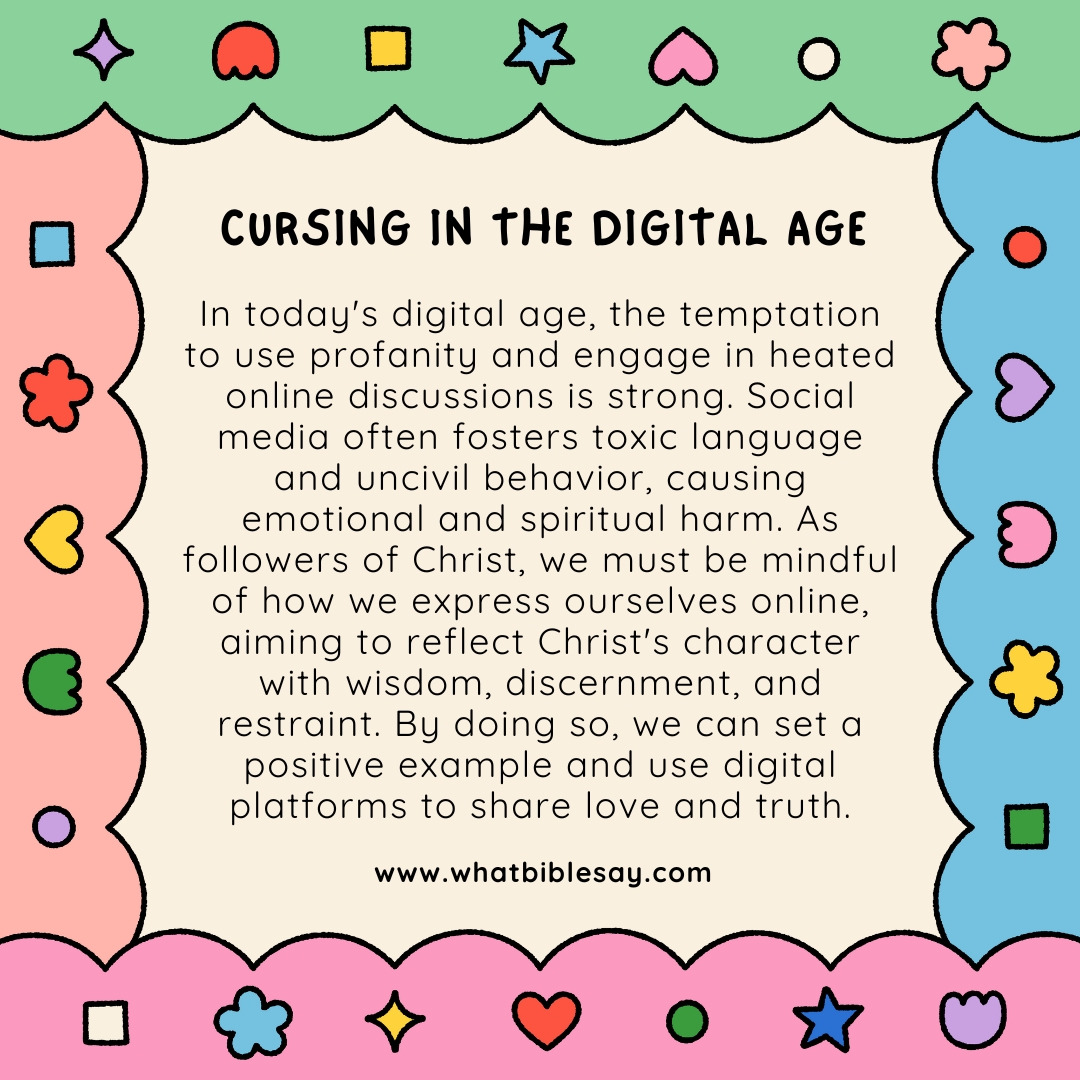The Bible highlights the importance of using our words wisely and avoiding cursing or profane language. Both the Old and New Testaments emphasize the power of the tongue, urging believers to choose words that bless and uplift rather than harm.
By exercising self-control and aligning our speech with biblical principles, we can honor God, build meaningful relationships, and positively impact the lives of others.
Key Takeaways
| Key Point | Details |
|---|---|
| Old Testament Teachings | Emphasizes the gravity of cursing, particularly dishonoring God’s name and disrespecting authority. |
| New Testament Teachings | Focuses on the connection between the heart and speech, emphasizing self-examination and discipline. |
| Power of the Tongue | Highlights the tongue’s ability to cause both great good and harm, urging mindful speech. |
| Consequences of Cursing | Destructive effects for both the speaker and others, as warned in the book of James. |
| Benefits of Blessing | Encourages words of kindness and wisdom to honor God and positively impact others. |
| Practical Guidance | Suggests prayer, self-discipline, and reliance on the Holy Spirit for controlling speech. |
| Cursing in the Digital Age | Warns against profanity in online interactions and encourages reflecting Christ-like behavior on social media. |
| Seeking Forgiveness | Advises humbly seeking reconciliation for past hurtful words to restore relationships and glorify God. |
The Biblical Perspective on Cursing
The Bible provides clear and authoritative teachings on the use of cursing and profane language, from the Old Testament to the New Testament. By understanding the scriptural perspective, we can gain valuable insights to inform our own speech and behavior.
1. Old Testament Teachings
The Old Testament emphasizes the gravity of cursing, particularly when it comes to dishonoring God’s name or disrespecting those in authority. These teachings laid the foundation for a higher standard of speech that would be further reinforced in the New Testament.
2. New Testament Teachings
In the New Testament, Jesus Christ and the apostles continued to emphasize the importance of using our words wisely and with intention. They highlighted the connection between the condition of our hearts and the words that come out of our mouths, underscoring the need for careful self-examination and discipline.
Practical Guidance for Taming the Tongue
Developing the ability to control our speech and align it with biblical principles is a lifelong process that requires diligence, prayer, and the power of the Holy Spirit. The Bible provides practical wisdom and guidance to help us in this endeavor.
1. Cultivating Self-Control
Self-discipline and mindfulness are essential in breaking the habit of cursing and developing the ability to speak with wisdom and restraint. By guarding our mouths, we can preserve our lives and avoid the ruin that can come from uncontrolled speech.
2. Replacing Curses with Kindness
When faced with the temptation to lash out with harsh words, the Bible encourages us to respond with kindness, compassion, and a forgiving spirit. By putting away bitterness and malice, we can reflect the love and grace of Christ in our interactions with others.
3. Seeking Forgiveness and Reconciliation
If we have already spoken words that have hurt or offended others, the biblical path forward is to seek forgiveness and reconciliation. By humbly acknowledging our mistakes and making amends, we can restore broken relationships and glorify God through our actions.
Conclusion: Honoring God with Our Words
The Bible’s teachings on the use of our words are clear and unambiguous. As followers of Christ, we are called to exercise self-control, seek to build up and encourage others, and ultimately honor God with the way we speak.
By aligning our speech with the principles found in Scripture, we can become powerful witnesses for the transformative power of the gospel, bringing glory to God and positively impacting the lives of those around us.
FAQs
1. What does the Bible say about cursing?
The Bible discourages cursing and using profane language, emphasizing the importance of using our words to bless others and honor God. Both the Old and New Testaments highlight the power and consequences of speech.
2. How can Christians control their speech according to the Bible?
Christians can control their speech by cultivating self-discipline, praying for guidance, and relying on the Holy Spirit. The Bible encourages replacing harsh words with kindness and seeking reconciliation for any harm caused.
3. Why is it important to avoid cursing in online spaces?
In the digital age, our words can reach a wide audience and have lasting effects. The Bible encourages believers to reflect Christ’s character in all interactions, including online, by exercising wisdom and restraint.
4. What are the consequences of cursing according to the Bible?
The Bible warns that careless or harmful speech can damage relationships, dishonor God, and lead to spiritual consequences. It also highlights the potential for positive transformation when choosing to bless others with kind words.






